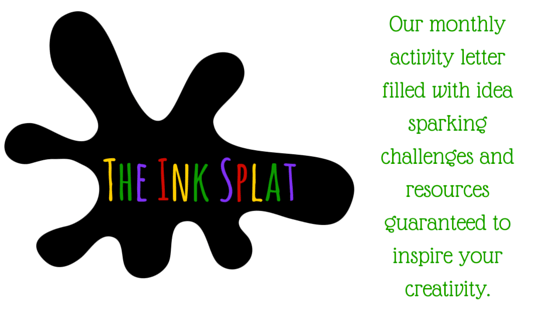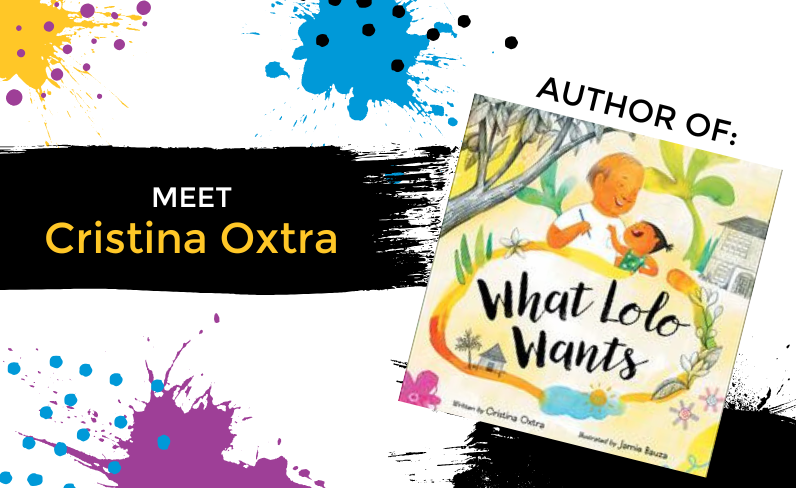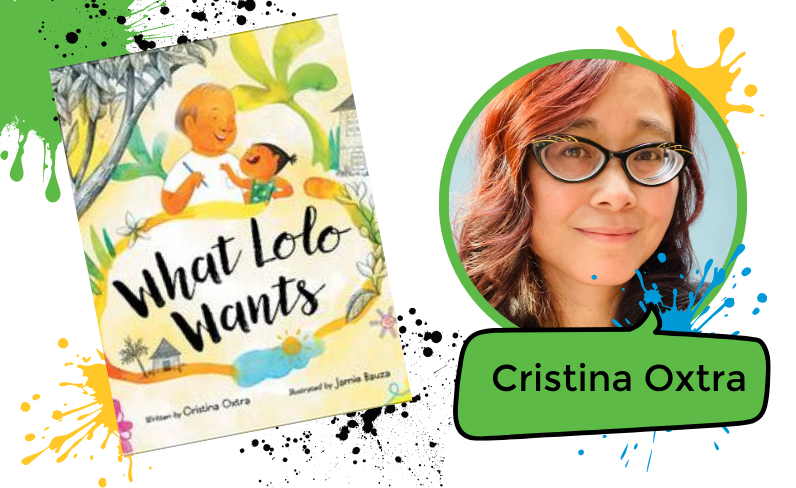This month’s Ink Splat Author Interview features Cristina Oxtra. Cristina is a Filipino-American author who has written picture books, historical fiction, biographies, and more! Her debut picture book, What Lolo Wants was released this fall.
This month, at Young Inklings, we’re nearing the end of our Inklings Book Contest application window, and many of our community members are working on a final revision for the story or poem they are submitting to the contest. We’ve been talking this month about how to Revise with Your Reader in Mind, and in our interview with Christina, we discuss how she approaches the revision process. We also discuss staging scenes and adding humor to your writing.
Learn more about Cristina at her website: www.cristinaoxtra.com

Writing Challenge
In Cristina’s interview, she shares about asking herself, “So what?” when she’s drafting. She uses this question to dig into why she’s including a character, a scene, an interaction, or even a detail. This month, many of our Inklings are revising their work to submit for the Inklings Book Contest. Others may be trying to decide between submitting one piece or another. Your writing prompt this month will hopefully support you in those efforts.
PROMPT:
Write a “Why I Wrote This” letter. Address your letter to a family member or friend who brings out your honest self. You don’t have to mail the letter (but you can if you want to!). The goal of your letter is to see your “So what?” more clearly.
In your letter, explain why you wrote this story or this poem. As you do, you’ll ask yourself questions and follow your curiosity … ultimately finding your way to the heart of your creative piece. For instance, you might realize that your character has a problem similar to something you’ve recently dealt with in your real life, or that your poem’s question is one you’re longing to answer for yourself or someone you love. When you identify the heart of your writing, you’ll know which piece matters most to you, and you’ll know which one to submit. You may also spot revision opportunities in your piece–elements you can add or remove to bring out its “So what?” even more clearly.
Consider inspiring your fellow Inklings by sharing your “Why I Wrote This” letter on the Inkwell. When you not only share your writing, but the thinking behind it, you help other writers see new possibilities for their own creative expression and growth.
For What Lolo Wants, how did you choose the topic and how did you craft it into a story?
I wrote What Lolo Wants while I was pursuing a Master of Fine Arts degree in creative writing. When I started in the program, my faculty advisor asked me to write from my own experiences to help me find my voice. I resisted and struggled because I wanted to write grand works of fantasy. I was uncomfortable about digging within me, mining for stories from my own experiences. But, every semester, I worked on it, and Just before my last semester, I found within me a story that I didn’t realize I could write, What Lolo Wants. This story was inspired by my grandpa, who became ill and started losing his memory when I was a child. I wanted to tell his story with the hope that it can help other children and families see the importance of communication when a family member is seriously ill. Children should be included in the family conversations to help them better understand and cope with such a challenging time for everyone.
What did you learn about your real-life experience after writing about it?
I learned about the impact grandparents can have on our lives. While I felt powerless when my grandpa became ill, I now have the power of the pen and I was able to tell his story and the impact he had on my life. Not only did he teach me how to draw, but he also used to tell me that one day, I would live in the United States. I thought that was impossible. A few years after he passed away, my family and I were able to immigrate to the U.S. Sharing my grandpa’s story is a way for me to honor him and the dream to live in the U.S. and have him live on in the pages of the book. I also learned that writing can be therapeutic. I didn’t realize that I had been carrying this traumatic experience within me for many years. Sharing my memories, expressing my thoughts and feelings through the story, was healing. I felt like I had come full circle and got the closure I had needed.
When it comes to staging scenes, how do you build action, dialogue, and design tools and strategies you use to know when a scene is really working?
I often start with dialogue. I don’t start writing a story until I can hear the characters talking in my head. I write out full-on conversations between the characters, one quote after another. No dialogue tags. Just whatever I can hear them saying. I also picture in my mind where and how these conversations are happening. I see them like scenes in a movie or a TV show. Their dialogue helps me place them where they are, what they may be doing, the expressions on their faces, and so on, and I build the action and story outward from there. I know a scene is working when it genuinely makes me feel the emotion that I want the readers to feel when they read that scene.
What are the questions you ask yourself when you’re drafting and revising a story?
When drafting, I ask a question a friend of mine asked me years ago when I was writing an essay. After reading each paragraph of my essay, she asked me, “So what?” Why was whatever I had written in that paragraph important? How did it relate to the topic? Why should the reader care? This made me think more about what I was writing, what was necessary and not, and the purpose. Now, when I’m drafting a story, I ask myself, “So what?” The main character is thinking this or doing that. So what? Why is that important? How does it move the story? Why would the reader care? Asking “so what?” helps me decide whether to include, omit, or expand on something in the story.
When revising, I have to determine whether or not it’s done. Do I stop now or are there more edits to be made? Have I written the best story I could write? They are difficult questions, and the answers are different for every writer because it depends on how they feel in their heart.
Teen Titans Go!, a series you’ve contributed to, incorporates humor. Please share your thoughts about humor in scenes.
Know your characters. Knowing their personalities, characteristics, backgrounds, likes, dislikes, interests, goals and dreams, quirks, pet peeves, can help determine what it is about them that would be funny and generate the right humorous material. Through knowing your characters well, you can decide whether that snarky word or sentence filled with exaggerations is really something they’d say. Or whether that hilariously slapstick action is something that fits them. I started each Teen Titans Go! book by creating a background story for their Multiverse doppelgangers. This background information helped me figure out the funny things they would say and do that was perfect for who they are, so they would feel realistic and authentic.
Know your audience. Consider who will be reading your book. What do you think they would find funny? If you were in their shoes, what would make you laugh? Do some research and read humorous stories written for that audience.
What advice would you give Young Inklings about the writing journey?
Every writer’s journey is different. Like a videogame, it’s usually never a straight path, and it will include knowledge and skills that need to be attained, challenges that must be overcome, and side quests that must be accomplished first before reaching the ultimate goal.
Therefore…
- Persevere. If writing is your passion, pursue it. Do all you can to learn about it and continually improve your craft. Keep writing. Just like a sport or any other art, practice makes progress.
- Be a lifelong learner. I’ve seen experienced, well-known authors who have written many books attending classes, listening to presentations, and participating in workshops. They take notes, ask questions, and continue to expand their knowledge. Do the same throughout your writing journey. Grow through your craft.
- Seek and accept feedback. Ask for others’ advice and thoughts on your work. When you receive feedback, try it. See if it helps your work. If it does not, you don’t have to use it. It’s your choice.
- Your story is important. There are many books about countless topics and you might say to yourself, “But there are books about (insert topic) already. Why should I write about it?” Why? Because only you can tell the story about that topic the way you tell it. It’s from your point of view, your lived experience, your imagination, your creativity, your twist or spin on it, your touch. No one else can tell it the way you can. We need all the storytellers and stories. There are people who will want to read it. So, don’t be afraid. Share your story with the world.

A special thank you to Cristina Oxtra for sharing with us!
Cristina Oxtra is a Filipino American author, born and raised in the Philippines. She lived in Minnesota for more than 20 years. She earned a BA in journalism and an MFA in creative writing for children and young adults. Her debut picture book, What Lolo Wants, was released Oct. 1, 2024. Her other books include three biographies, six early readers, a middle grade historical fiction, a Manga-inspired graphic novel, and a choose-your-own adventure. My chapter books, Darkseid’s Food Feud, High Seas Hijinks, and Mother Mae-Eye’s Creature Calamity, part of the Multiverse Adventures series featuring DC superheroes, the Teen Titans, were released recently. My website is at www.cristinaoxtra.com.
Check out Cristina’s book and all of our recent Ink Splat authors’ works at our Bookshop.org Store.

INKLINGS CONNECT
Fall Creative Writing
Join us for a Writers Circle, 1:1 Mentorship, or Publishing Program this fall. We can't wait to see what you create!
Keep your creativity flowing with our upcoming community events:

SUBSCRIBE
Subscribe to stay in touch with Society of Young Inklings. You’ll receive our monthly Ink Splat newsletter and be the first to know about upcoming events and ways to connect with Young Inklings.




